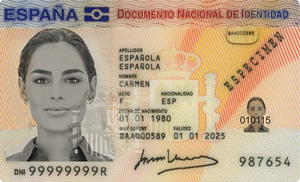A national ID card (DNI) is the document used to verify a person’s identity, whether in person with law enforcement or online when filling out forms. In face-to-face situations, identity theft is far more difficult because the document includes a photo for verification.
Online, however, it’s a different story. Since your face isn’t tied to the number, stealing an ID becomes much easier. That’s why ID theft on the internet is alarmingly common, and many hackers and scammers exploit stolen IDs to commit all kinds of fraudulent activities for their own gain.
Below, we’ll break down the most frequent problems that occur when an ID number is stolen—and what steps you can take if it happens to you. Whether you’ve already been affected or want to prevent it, this guide will help you understand the risks and protect your identity. You’ll also learn what someone can do with a photocopy of your ID.

Is it risky to share your ID number?
Your national ID number is a sensitive piece of personal information—it’s often used to verify your identity when completing official procedures or online transactions. That’s why you should never share it with others, and under no circumstances should you post it publicly. Whenever you make a purchase online, double-check who you’re giving your details to.
One of the most common methods by which criminals steal this information is through phishing. In these scams, a fake website is designed to look legitimate. Victims enter their personal data without realizing it’s being captured and stolen.
Whenever you’re asked to provide your ID number online—whether in a form, an application, or a request—always make sure you know exactly who is requesting it and why. Just as important, never upload or share documents that display your ID number.
Some of the most frequent mistakes include:
- Posting a photo of your ID to show your birthday.
- Accidentally sending a copy to the wrong email address.
- Giving it to second-hand sellers as a supposed “identity check.”
In most situations, none of this is necessary, and it should raise red flags.
Finally, avoid storing a copy of your ID in shared folders or on unprotected devices. If a file with your ID is saved on your computer or phone without proper security, hackers can access it and steal the document without you even noticing.
What can criminals do with your ID number online?
When cybercriminals get hold of your ID number online, their main goal is profit—and that usually means fraud. With just your ID number, a criminal can sign up for services in your name, leaving you responsible for the consequences.
They can also impersonate you when completing online transactions or official procedures. If those activities fall into a legal gray area—or are outright illegal—you may end up facing the consequences simply because your ID number is attached to them.
Some of the most common crimes linked to stolen IDs include:
- Opening bank accounts in your name.
- Applying for quick online loans.
- Making purchases on e-commerce sites.
- Registering on online gambling platforms.
- Signing up for internet or subscription services.
These services are often easily accessible and require little to no verification. In many cases, simply providing an ID number is enough to set up an account—without you ever knowing. The problem comes when payments are missed or fraud is discovered. You’re the one who will be contacted first, since your ID number is on record.
At the end of the day, using a stolen ID is all about impersonation. The criminal enjoys the benefits of the service while you’re left to deal with the fallout.
What to do if you find your ID number online?
Avoiding posting your ID online is important, but sometimes it’s not enough. Even if you’ve been careful, someone else may upload your ID without your knowledge or consent. If you ever discover your ID number exposed on the internet, here’s what you should do:
- Contact the person or entity that uploaded it and request immediate removal.
- If you can’t reach them, contact the website hosting the content or the server provider.
- If there’s no response, or if the process drags on, file a report with the authorities right away.
Go to your local police station and report that your ID has been exposed online. Once your complaint is filed, authorities can take legal steps to have the content removed as quickly as possible.
Another option is to seek help from specialized services in online data removal, such as Repscan, or from regulatory agencies like the Spanish Data Protection Agency (AEPD).
When it comes to ID theft, speed is critical. The longer your ID remains online, the higher the risk it will be misused. That’s why the best course of action is to act immediately—whether by filing a police report or contacting professional services.
 Reply to reviews with AI NewAdjust style, length and language. Nine styles: formal, warm, empathetic, corporate, casual, humorous, inspirational, minimalist and detailed. Rules by location and consistency across all profiles.Learn more about the reviews platform ➜9 styles: formal, warm, corporate and 6 more so you can pick the one that fits your voice best.Set length and language. Short, medium or long.Learns from previous replies and improves with every use.Reply automatically or create drafts to review and publish.
Reply to reviews with AI NewAdjust style, length and language. Nine styles: formal, warm, empathetic, corporate, casual, humorous, inspirational, minimalist and detailed. Rules by location and consistency across all profiles.Learn more about the reviews platform ➜9 styles: formal, warm, corporate and 6 more so you can pick the one that fits your voice best.Set length and language. Short, medium or long.Learns from previous replies and improves with every use.Reply automatically or create drafts to review and publish. EN
EN
![]() 936 386 559
936 386 559











